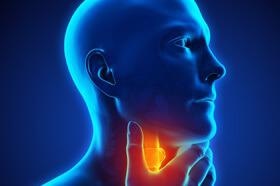
Image Credit: American Society for Radiation Oncology (ASTRO).
The AI model can serve as a non-invasive, low-cost choice for screening, staging and customized therapy planning for the disease. The results of this study will be published in the 2022 Multidisciplinary Head and Neck Cancers Symposium.
Dr. Annie Chan adds, “If it is cancerous, we can further predict the tumor stage, the nodal stage, and the presence or absence of BRAF mutation. If caught early, this disease is highly treatable, and patients generally can expect to live a long time after treatment.”
Researchers received 1,346 thyroid nodule images via regular diagnostic ultrasound from 784 patients to train and evaluate the AI platform. The ultrasound images were categorized into two datasets: one dedicated for internal training and validation, and another for external validation.
Malignancy was proved with the obtained samples from the fine needle biopsy. With operative reports and genomic sequencing, pathological staging and mutational status were established, respectively.
In contrast to the traditional AI approach, scientists integrated multiple AI methods for the model, which included radiomics that retrieves a huge number of quantitative features from the images and topological data analysis (TDA) that tests the spatial relationship among data points present in the images.
They also used deep learning, in which algorithms drive the data via several layers of an AI neural network to produce predictions, and machine learning (ML), where an algorithm uses Thyroid Imaging Reporting and Data System (TI-RADS)-characterized ultrasound features as ML properties.
By integrating different AI methods, we were able to capture more data while minimizing noise. This allows us to achieve a high level of accuracy in making predictions.
Dr. Annie Chan, MD, Study Senior Author and Director, Head and Neck Radiation Oncology Research Program, Mass General Cancer Center
A multimodal platform using the above-mentioned four methods precisely predicted 98.7% malignancies of thyroid nodule in the internal dataset, considerably outdoing individual AI modalities that are used alone.
In comparison, the individual radiomics model predicted 89% malignancies (p < 0.001 when compared to the multimodal platform), the deep learning model obtained 87% accuracy (p = 0.002), and TDA and (ML)TI-RADS were precise for 81% and 80% of the samples, respectively (with p < 0.001 for both models). The model was 93% precise for malignancy prediction on the external validation dataset.
A multimodal model involving radiomics, TDA and (ML)TI-RADS was also capable of distinguishing pathological stage (with 89% for N-stage, 93% accuracy for T-stage, and 98% for extrathyroidal extension). Additionally, the model determined BRAF V600E mutation that can be cured with targeted treatment, with 96% accuracy.